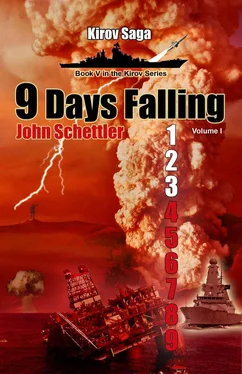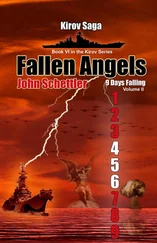“That would be risky,” said MacRae. “Let’s not forget about those long range Russian missiles. But we could see about getting a UAV up for a look. I’ll bet our friends in NATO might help, if it’s deemed critical.”
“I can make it critical,” said Elena, and MacRae knew she would do exactly that.
Eveningcame, one more in its endless round. Light, pale and diffused, washed over the gray bank of low clouds that slouched heavy and tiresome in the still air and obscured the winding interface of land and sea with its listless presence. And the sea itself moved with a languorous swell; the land lay hushed and subdued. The helmsman aboard Argos Fire gazed out on the indolent waters of the bay, leaden-eyed and waiting for relief.
The ‘wine dark sea’ was Homer’s poetic description for the deep burgundy stillness that falls upon the waters of the sea at sunset. Achilles was said to have looked upon it as he mourned the loss of his beloved Patroclus, killed by Hector before the gates of Troy. Achilles would have been gazing at the Aegean, but as Captain MacRae looked west that evening, the calm waters of the Black Sea seemed a blood red merlot, deepening to shadowy black on the horizon. The sea belies itself, he thought. If Morgan is right on this one, we’ll have trouble soon, and more than we need.
Mack had sent up an Intelligence decrypt indicating that the Russian Black Sea Escadra was about to sortie—bad news for Fairchild & Company at a time like this.
He watched as the sun fattened over the water, the sky a wash of crimson and charcoal gray. MacRae was standing with his executive officer, Commander William Dean, and they were watching the long range returns on the Sampson AESA Radar system for any sign of what Morgan had warned. It was an active electronically scanned array that could broadcast a strong signal spread out over the band so effectively that it seemed little more than background noise to other receivers. The radar was mounted atop the tall, fully enclosed mainmast that had been characteristic of the Type 45 destroyer, and Argos Fire was exactly that.
The Sampson array sat in a great white ball at the top of the main mast, rotating inside at 30 revolutions per minute. The AESA technology allowed it to generate many more sub-beams than a typical radar set, and therefore track many more targets at one time. It also changed frequency with each pulse sent out and could send a rainbow of varied frequencies out in a single beam. In effect, it had powerful detection capabilities while remaining difficult to intercept by other radar listening devices and highly resistant to jamming.
Positioned high above the sea, it also provided excellent coverage against any low level target while extending the overall horizon distance. It could therefore range out to 400 kilometers, all the way up the Black Sea coast to the big Russian naval base at Novorossiysk. MacRae didn’t like what he saw there on the signal returns.
“I’m getting multiple contacts now,” said Radar man Haley. “ Yes, sir. It looks like they’re getting ASW helos up off their frigates. I’d say Morgan was correct. The fleet is putting out to sea.”
“As will we in short order,” said MacRae, looking at his wrist watch. The loading operation had been underway for some time, and went faster than expected. Authorities at the terminal were initially prone to haggle, producing reams of administrative paperwork and sending over requests for verification of letters of credit. The Terminal was principally a British Petroleum project established at the turn of the century, but was now 100% nationalized by the Georgian State. A half hour later they were much more cooperative. MacRae had dispatched two squads of Argonauts, the elite commando that served the interests of the ship, and the Fairchild Corporation. The men fanned out to secure the four big storage tanks the fiscal metering station, with a special detail assigned to guard the central control room and export loading system.
The three Fairchild tankers were docked well offshore, and the export system was a series of diesel driven pumps that moved crude oil from the storage tanks through the export meter, and then into a 36 inch pipeline that extended over 5 kilometers to a securing buoy off shore. Here there were several 20 inch floating hoses that would connect to the waiting tankers. It was soon clear that Elena Fairchild would have her oil, one way or another, and the loading procedure had been underway for a little over three hours before the trouble began.
The Georgian Terminal Export official’s new found smile had been little more than a thin veil. He had apparently made a call to the coast guard base at Poti, and Haley soon reported he had a close signal return of a small craft approaching the loading zone.
“What have we got, Mister Haley?” MacRae was at his side again.
Haley had been checking his database and was quick to answer. “Georgian Coast Guard patrol craft, a single boat, Grif Class. Forty-eight tonner. It’s small, fast, but not much of a threat. It has an eleven man crew with two twin 12.7mm machine gun turrets, manually operated. That’s all the bite they have.”
“Well that may not impress the two of us,” said MacRae, “but I wouldn’t want them raking the hull of any of our little princesses out there with those guns.”
“Aye, sir.”
They could hear the distant whine of a siren as the patrol craft bravely rushed to the scene. MacRae wanted them on the radio and moments later he was speaking with the boat’s skipper.
“Top of the morning,” he said calmly. “Captain Gordon MacRae, Fairchild Enterprises, aboard corporate HQ Argos Fire here. How may we assist you?”
There was a brief pause before the return call came. “Good morning, Captain. I have received a call from the Georgian Export Ministry and it seems that we have instructions to close this terminal. You will have to cease loading operations at once. Over.”
MacRae raised an eyebrow. Elena Fairchild would not stand for that in any wise, so he decided to explain the situation. “See here,” he began. “We’ve proper letters of credit, all approved in the last twenty four hours. We’ve export credits that are more than adequate for the tonnage involved. Our operation is well underway and we have a tight schedule to meet.”
“That may be so, Captain, but I have my orders. You will have to cease operations and move your tankers off shore beyond the ten kilometer marker. Over.”
MacRae looked over his shoulder at his XO, Commander Dean. “He’s not much impressed by our paperwork, Mister Dean.”
“It doesn’t sound like it, sir.”
“Well, I’m not much impressed by his twin MG mounts either. I think we’ll just continue with the operation and ignore this situation for the moment. Let’s see if he’s prepared to press the matter.”
They watched as the boat approached. “Those were once KGB boats, were they not, Mister Haley?”
“I believe so, sir. They were taken over by the old Georgian Navy and then folded into the Coast Guard.”
“Anything else they might send our way?”
“No, sir. They had two missile boats, Dioskura and Tiblisi , but they’re sitting at the bottom of the bay at Poti up north. The Russians beat up what was left of the force pretty bad in that scrap they had with Georgia in 2008. They have a total of five of these boats left, and a couple P-24 fast attack boats they bought from Turkey. Both those are at Batumi , sir.”
Another radio call came in from the boat, this time more insistent. “Captain MacRae, we have no word that you are ready to comply with our instructions. I must insist you terminate your operation at once.”
Читать дальше












